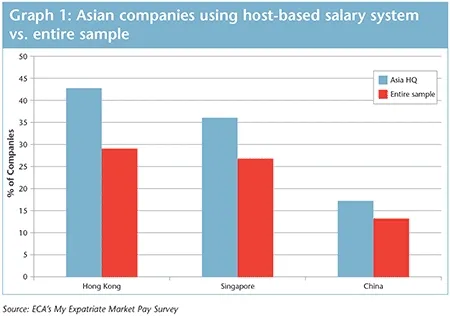
How the 'local plus' approach can cut costs of expat staff in Hong Kong
By Euan JonesDespite today's economic uncertainties, global mobility remains integral to the way businesses operate. Multinational companies must grapple with the challenge of increasing the number of international assignments while managing costs.
Increasingly, international HR managers are considering the host-based salary system as a potentially cost-effective alternative to the traditional home-based approach – particularly in markets like Hong Kong and Singapore, where local wages are relatively high.
However, although the host-based approach can reduce costs in certain cases, it is not suitable for all assignments. A clear understanding of the advantages and disadvantages of host-based packages is a must if they are to be implemented successfully.
Of the various types of host-based salary systems used by multinational companies, the 'local plus' approach is the one that tends to attract most interest.
This is based on a salary commensurate with local salaries, but supplemented by additional benefits and allowances – typically, free housing and education for children.
Pay is typically delivered in the host country currency and the assignee bears any reduction in purchasing power due to exchange rate movement. They are also usually responsible for tax liabilities.
Because the host-based package is aligned to local salaries, it may affect the assignee's purchasing power if there is a disparity between home and host country pay. The host-based system is therefore most common where the host location has similar or higher pay levels, standards of living and economic development.
The MyExpatriate Market Pay 2012 Survey (an annual audit of expatriate compensation globally) revealed that Asian-headquartered companies are most likely to use the host-based approach, especially for transfers within the Asia-Pacific region.
Graph 1 shows the relative popularity of local salary systems among Asian headquartered companies for assignments into Hong Kong, Singapore and China.
Unsurprisingly, host-based systems are common in assignments to Hong Kong and Singapore because of the relatively high wages and living standards there. Fewer companies currently use the host-based system in China, where salaries still lag, although this may change as economic growth pushes up wages and living standards.
More cost-effective?
The MyExpatriate Market Pay survey shows that the main savings offered by the host-based approach derive from a leaner benefits package.
Graph 2 compares the differing benefit and allowance policies of companies using home versus host-based packages in Hong Kong. It shows that, in addition to a local base salary, the host-based package typically includes the 'plus' elements of free housing and help with the cost of children's education.
The home-based package, on the other hand, is more likely to include other additional benefits, such as a car. It typically includes a cost of living allowance, expatriate incentive and a location allowance, which are all unusual in host-based packages.
Benefits provided within host-based packages are often of lower value than the same benefits provided by companies using home-based ones.
Our data on accommodation costs illustrates this: graph 3 compares the average cost of accommodation provided to assignees on host- and home-based packages with the average for the entire sample in Hong Kong by ECA's job-point levels.
This shows that companies using the host-based system provide a markedly lower level of financial assistance for host-country housing.
This means significant cost savings due to Hong Kong's high rents. The average accommodation cost for executives at 140 points on host-based salary packages is approximately 30 per cent lower than their counterparts on home-based packages – an average saving for the company of over HK$285,000.
Unsurprisingly, companies using the home-based salary system tend to provide the highest level of financial assistance for host-country accommodation – around 18% more than the overall average for 140 points.
The reason why companies using the host-based approach provide less generous housing assistance may be down to their different perspective. This approach is based on the premise that international assignees can 'live like a local'.
Therefore, the areas and accommodation they are housed in should, in theory, be comparable to those of local employees of a similar job grade and family status.
International assignees on the host-based system are therefore less likely to live in expensive 'expat areas'.
Where to use the local plus approach?
Because, using the host-based approach, assignee pay is related to that of local peers, it not only costs less, but it's also more equitable.
Assignees will receive the same level of compensation in a particular host location, regardless of nationality.
But another consequence of this approach is that pay is no longer linked to compensation in the home country, and is therefore not comparable to home-country peers. Moreover, local approaches don't protect the assignee's purchasing power and thus discourage inter-country mobility, except to locations with equal or higher buying power.
Consequently, host-based approaches are most successful when there is a close affinity between salaries in the home and host locations.
Graph 4 shows that, within Asia, the host-based approach is most common in developed, typically high-income locations such as Hong Kong and Singapore, and least common in emerging economies where local salary levels are much lower than the expatriate market rate.
India, where local pay is just 38% of the current expatriate market rate (at 110 job-points), provides an example.
This shows that companies using the host-based salary system are not generally doing so simply to reduce assignment salaries.
This would be counterproductive: fewer employees would accept the assignment offer if it meant a significant reduction in their purchasing power.
Companies may also want to avoid using the host-based approach for assignments from low to high income countries if they are worried about employees being reluctant to accept repatriation or a new assignment.
This is why the host-based approach is more common when there is a close alignment between home, host and expatriate pay.
In summary, the 'local plus' approach can be a cost-effective alternative to the traditional home-based build-up because of the leaner and less costly benefits package, but it is not always suitable.
Companies need to consider the circumstances of each assignment carefully.




















 Advertise
Advertise






